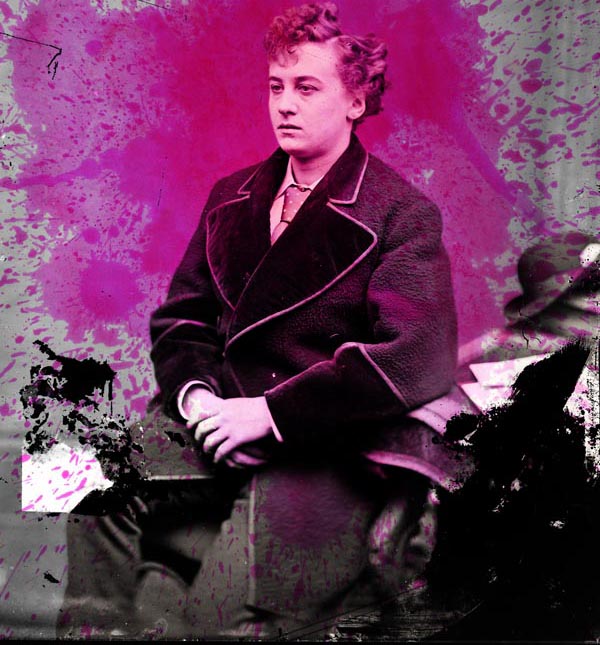Brighton Festival: Stella, Theatre Royal | reviews, news & interviews
Brighton Festival: Stella, Theatre Royal
Brighton Festival: Stella, Theatre Royal
A Victorian's spectacular transgender life, bleakly and obliquely told

A Victorian transgender celebrity is a fitting and timely subject for this Brighton Festival premiere. Writer-director Neil Bartlett turns Stella’s scandalous life into a stark horror story, marked by the regular, jarring crash of glass which sounds like splintering flashbulbs, mirror images breaking and jabbing at an older man (Richard Cant) whose hand is already slashed and bandaged, as he awaits a fatal knock on the door.
The real Stella, pictured below, was otherwise known as Ernest Boulton, who alternated passing as a glamorous, touring female actress with plying for West End trade dressed as an equally unmissable prostitute, until she was arrested outside London’s Royal Strand Theatre after flirting with male audience members and using the ladies’ loo. A long affair with a devoted Tory MP, Lord Arthur Pelham-Clinton, was revealed during a sensational trial; after being found innocent of intending sex with men, Stella parlayed the notoriety into further touring, while Pelham-Clinton likely committed suicide. Stella’s decline into battered, dying Ernest Blair, the final identity portrayed by Cant, sounds like a typical show business fall of fading looks and prospects, as well as an exhausted renouncement of female identity. Bartlett's explanation of this in the programme is perhaps too essential, the facts of the case buried deep.
 Though Cant and Batterham’s physical resemblance makes the link between these two very different figures clear, Cant’s Ernest also seems to bear traces of the Arthur who Batterham’s Stella forlornly expects, as she dresses and makes herself up for some sort of audience. Cant recalls The Elephant Man’s makeup-free stage productions as a man psychologically twisted out of shape. Bandaged, vomiting, dying, exiled from the theatrical life and his desired sexuality, his bitter dignity constructs itself from the shredded indignity of his circumstances, teetering on a hysterical, spittle-flecked edge. His shards of proud, Wildean wit are more intact in Stella, whose beauty, glamour, hope and pride are embodied by Batterham. He gorgeously erases gender lines, though society won’t.
Though Cant and Batterham’s physical resemblance makes the link between these two very different figures clear, Cant’s Ernest also seems to bear traces of the Arthur who Batterham’s Stella forlornly expects, as she dresses and makes herself up for some sort of audience. Cant recalls The Elephant Man’s makeup-free stage productions as a man psychologically twisted out of shape. Bandaged, vomiting, dying, exiled from the theatrical life and his desired sexuality, his bitter dignity constructs itself from the shredded indignity of his circumstances, teetering on a hysterical, spittle-flecked edge. His shards of proud, Wildean wit are more intact in Stella, whose beauty, glamour, hope and pride are embodied by Batterham. He gorgeously erases gender lines, though society won’t.
Even the pronouns in this review are loaded and mutable, showing the fraught terrain Bartlett explores. It’s questionable whether Stella’s 30-year career, and very different brush with her sexuality’s illegality to that of the martyred Oscar Wilde – ending not in Reading Gaol, but getting off scot-free – is the grim, broken tragedy Bartlett presents (though I bow to the letters and other ephemera from Stella’s life he explored in his research, alongside interviews with current transgender figures, whose words are slipped into the script). There’s certainly the sense of a bigger, bolder story between the sometimes opaque lines here.
Stella is both memorably, grimly fascinating and underpowered. The highs of this life aren’t attempted. What lingers are Cant’s helpless, self-lacerating rage and woundedness, and Batterham’s wholly androgynous beauty, which make Bartlett’s case better than words.
rating
Explore topics
Share this article
The future of Arts Journalism
You can stop theartsdesk.com closing!
We urgently need financing to survive. Our fundraising drive has thus far raised £49,000 but we need to reach £100,000 or we will be forced to close. Please contribute here: https://gofund.me/c3f6033d
And if you can forward this information to anyone who might assist, we’d be grateful.

Subscribe to theartsdesk.com
Thank you for continuing to read our work on theartsdesk.com. For unlimited access to every article in its entirety, including our archive of more than 15,000 pieces, we're asking for £5 per month or £40 per year. We feel it's a very good deal, and hope you do too.
To take a subscription now simply click here.
And if you're looking for that extra gift for a friend or family member, why not treat them to a theartsdesk.com gift subscription?
more Theatre
 Troilus and Cressida, Globe Theatre review - a 'problem play' with added problems
Raucous and carnivalesque, but also ugly and incomprehensible
Troilus and Cressida, Globe Theatre review - a 'problem play' with added problems
Raucous and carnivalesque, but also ugly and incomprehensible
 Clarkston, Trafalgar Theatre review - two lads on a road to nowhere
Netflix star, Joe Locke, is the selling point of a production that needs one
Clarkston, Trafalgar Theatre review - two lads on a road to nowhere
Netflix star, Joe Locke, is the selling point of a production that needs one
 Ghost Stories, Peacock Theatre review - spirited staging but short on scares
Impressive spectacle saves an ageing show in an unsuitable venue
Ghost Stories, Peacock Theatre review - spirited staging but short on scares
Impressive spectacle saves an ageing show in an unsuitable venue
 Hamlet, National Theatre review - turning tragedy to comedy is no joke
Hiran Abeyeskera’s childlike prince falls flat in a mixed production
Hamlet, National Theatre review - turning tragedy to comedy is no joke
Hiran Abeyeskera’s childlike prince falls flat in a mixed production
 Rohtko, Barbican review - postmodern meditation on fake and authentic art is less than the sum of its parts
Łukasz Twarkowski's production dazzles without illuminating
Rohtko, Barbican review - postmodern meditation on fake and authentic art is less than the sum of its parts
Łukasz Twarkowski's production dazzles without illuminating
 Lee, Park Theatre review - Lee Krasner looks back on her life as an artist
Informative and interesting, the play's format limits its potential
Lee, Park Theatre review - Lee Krasner looks back on her life as an artist
Informative and interesting, the play's format limits its potential
 Measure for Measure, RSC, Stratford review - 'problem play' has no problem with relevance
Shakespeare, in this adaptation, is at his most perceptive
Measure for Measure, RSC, Stratford review - 'problem play' has no problem with relevance
Shakespeare, in this adaptation, is at his most perceptive
 The Importance of Being Earnest, Noël Coward Theatre review - dazzling and delightful queer fest
West End transfer of National Theatre hit stars Stephen Fry and Olly Alexander
The Importance of Being Earnest, Noël Coward Theatre review - dazzling and delightful queer fest
West End transfer of National Theatre hit stars Stephen Fry and Olly Alexander
 Get Down Tonight, Charing Cross Theatre review - glitz and hits from the 70s
If you love the songs of KC and the Sunshine Band, Please Do Go!
Get Down Tonight, Charing Cross Theatre review - glitz and hits from the 70s
If you love the songs of KC and the Sunshine Band, Please Do Go!
 Punch, Apollo Theatre review - powerful play about the strength of redemption
James Graham's play transfixes the audience at every stage
Punch, Apollo Theatre review - powerful play about the strength of redemption
James Graham's play transfixes the audience at every stage
 The Billionaire Inside Your Head, Hampstead Theatre review - a map of a man with OCD
Will Lord's promising debut burdens a fine cast with too much dialogue
The Billionaire Inside Your Head, Hampstead Theatre review - a map of a man with OCD
Will Lord's promising debut burdens a fine cast with too much dialogue

Add comment